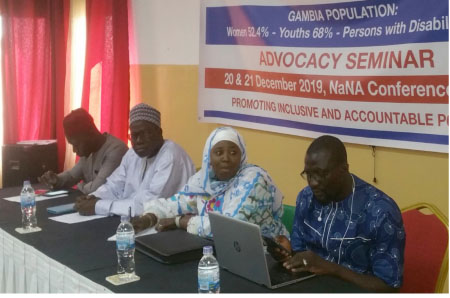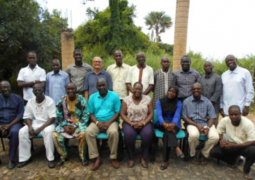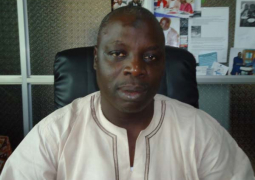
Rohie
Bittaye-Darboe, permanent secretary at the Ministry of Women, Children and
Social Welfare has said that everyone has the right to vote and be voted for,
but women and girls and physically challenged people are diverse group who
experience various degree of discrimination and face many systemic barriers in
exercising their political rights.
Madam
Bittaye-Darboe was speaking on Friday during a two-day advocacy seminar for
National Assembly Members on inclusion, participation and representation of
women, youth and people with disabilities.
The
seminar which brought together NAMS and civil society groups was held at the
NaNA conference center.
The
seminar is meant to bring lawmakers around the issues of inclusion, participation
and representation of youth, women and physically challenged with the wider
objective of enhancing the political space to strengthen democracy and good
governance.
She
further said talked about the inclusion of the marginalised group of women,
youth and persons with disabilities in politics, pointing out that temporary
measures should be put in place that women, youth and persons with disabilities
should not only be cheering and clapping for political leaders but should also
be given the chance to participate not only in politics but in national
affairs.
“Persons
with disabilities should be part of the party structures, selected committees
and other national set ups such as education, finance, lack of skills and most
especially socio-cultural beliefs and norms do affect the inclusion of women,
youth and people with disability,” she said.
According
to her, in order to increase their participation and representation in the
political affairs of this nation, there is a need to consider the promotion of
women’s and persons with disabilities participation as voters and candidate in
electoral processes through training, awareness campaign and promoting equal
opportunity in electoral management bodies and also promoting the use of
temporal special measures including gender quotas.
Muhammed
Krubally, the chairperson of The Gambia Federation of the Disabled noted that
disabilities are not the characteristics that define the future of persons with
disabilities, noting that they always organise workshops, advocacy sessions and
awareness creation for government, non-governmental organisations, parastatals
and individuals so that they will be included in policies, programming and
decision making in the country.
“Because
we believe that if persons with disabilities are fully integrated into
policymaking would be a wonderful strategy for any government,” he said.
He
also called on the government of The Gambia to always consider persons with
disabilities in terms of employment, education and contesting for elections
both at the cabinet, National Assembly, mayoral and councillors’ elections.
Read Other Articles In Article (Archive)
Sickle cell anemia a major health issue
Jun 17, 2016, 10:34 AM



